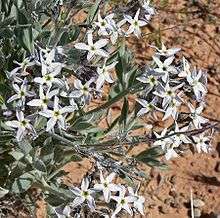Amsonia tomentosa
Amsonia tomentosa is a species of flowering plant native to the southwestern United States (S California, S Nevada, Utah, Arizona, New Mexico, W Texas) and northern Mexico (Chihuahua).[1][2] Its common names include woolly bluestar and gray amsonia.
| Amsonia tomentosa | |
|---|---|
 | |
| Amsonia tomentosa - woolly form | |
| Scientific classification | |
| Kingdom: | Plantae |
| Clade: | Tracheophytes |
| Clade: | Angiosperms |
| Clade: | Eudicots |
| Clade: | Asterids |
| Order: | Gentianales |
| Family: | Apocynaceae |
| Genus: | Amsonia |
| Species: | A. tomentosa |
| Binomial name | |
| Amsonia tomentosa | |
| Synonyms | |
| |
Amsonia tomentosa is a short, woody plant with many erect stems rarely reaching half a meter in height. The plant has two forms, a green glabrous (hairless) form, and a gray woolly form. The leaves are oval but pointed, and about 3 centimeters long. The flowers are white with a green or blue tint. They are tubular at the base and have flat faces with five petals. The flowers often come clumped in a cyme inflorescence. The fruits are podlike follicles that may separate into sections, each bearing a seed.
- Varieties
- Amsonia tomentosa var. stenophylla Kearney & Peebles – Arizona, New Mexico, Utah, Texas, Chihuahua
- Amsonia tomentosa var. tomentosa – S California, S Nevada, NW Arizona
Uses
Among the Zuni people, a compound poultice of the root of the tomentosa variety is applied with much ceremony to rattlesnake bite.[3]
References
- Kew World Checklist of Selected Plant Families
- Biota of North America Program 2013 county distribution map
- Stevenson, Matilda Coxe 1915 Ethnobotany of the Zuni Indians. SI-BAE Annual Report #30 (p. 53)